Toronto International Film Festival 2017 Report Part 1: Unhappy Family Syndrome
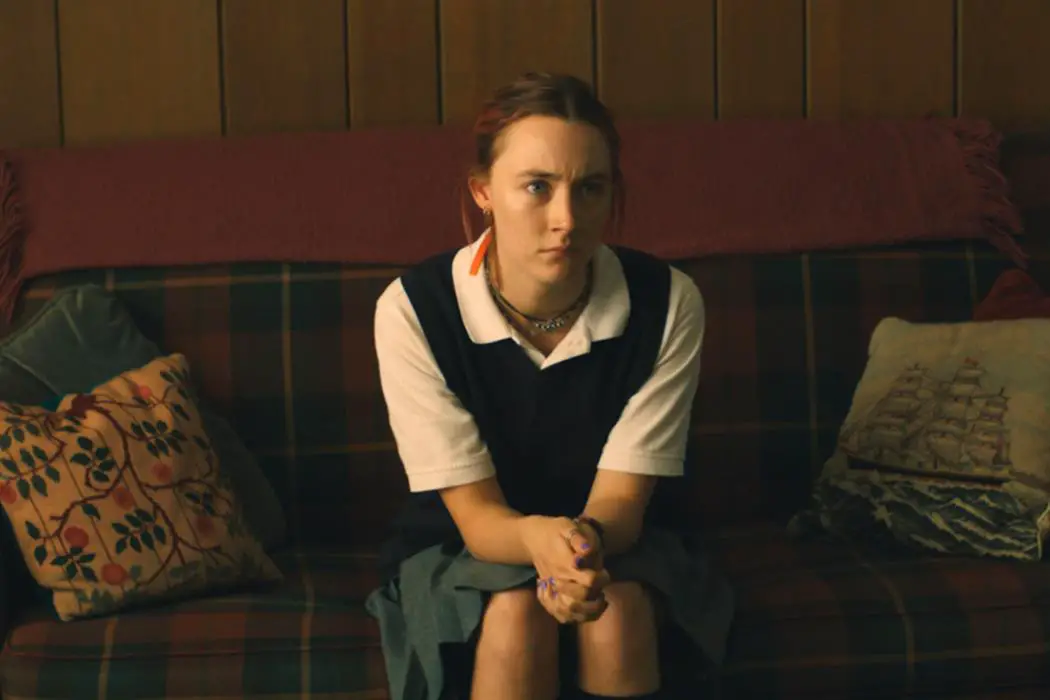
Tomas is a chronic cineaste who studied English literature in…
TIFF. Toronto. For eleven days, one of the cinematic capitals of the world, where curious onlookers have a chance to hobnob with A-listers, sponsors beg you to sample their products on Festival Street, long lines of eager ticketholders queue up beside some truly elegant theatres (sometimes shoulder-to-shoulder), and badge-wearing press and industry people hug their Starbucks tight to their chests as they speed-walk to various screenings at the Scotiabank Theatre (where two unwieldy escalators have generated memes and infamy due to their unreliability).
This year, for the first time, I was granted accreditation to cover the festival for Film Inquiry. In past years, I have relied solely on pricey public screenings to get my fill of the hottest titles and smaller gems; if you’ve been with us since last year, you may remember that I kept diary entries that charted my experience. This year, with a press badge, I’ve been seeing far less of the general public than I used to, and I must admit that it’s weird not having programmers come out to introduce the screenings, or having filmmakers and actors hold Q&As right in the theatre as opposed to tightly-managed press conferences. The normalcy of the screenings have taken some getting used to, but at the end of the day, I’m still seeing a great selection of premiere cinema, so who am I to complain?
And so, on September 7th, after strolling to the Press & Industry Office to obtain my badge and complimentary tote shoulder-bag (which included a schedule and a free water bottle), I was ready to hit the festival in stride. I may not be an old hand at this gig, nor am I a known face in the crowds and lines that congregate in Scotiabank’s halls (though, perhaps, that may change someday). Yet I’m still committed to giving you, dear reader, an early look at some familiar titles and hidden gems. I’m still committed to sharing my thoughts, writing reviews of quality and erudition, and being your eyes and ears as the film season begins to heat up in these last few months of 2017.
So please, share this journey with me.
Loveless (Andrey Zvyagintsev)

Andrey Zvyagintsev’s filmmaking is like a constant chill in the air that pummels you into submission. His worlds are perpetually bleak and unprepossessing; his characters people you would hardly wish to know in real life. The thing is, though: the stringency of his social critiques are made ten times more effective as a result, and Loveless is no different.
Literally, yes, the atmosphere is made chilly when his camera captures snapshots of snowy Russian landscapes at both the start and end of the film, taking in various minutiae such as glassy ponds and bare tree branches to first lull your senses, and then punctuate the unforgiving terrain with a final wallop of nihilistic despair. Figuratively, the chill permeates the very fabric of Russia’s socioeconomic sectors, where husbands and wives quarrel violently, casually initiate extramarital affairs, and neglect their own children because they have no concern for anyone but themselves.
This comes to the fore when Zhenya (Maryana Spivak) and Boris (Aleksey Rozin) snipe and snap at each other like feral cats as they finalize their ugly divorce, frightening their young son Aleksey to the point where he eventually makes a choice. Zvyagintsev holds this crucial plot point from us until about midway through, and it’s a brave decision considering it’s the film’s pivotal event. Beforehand, though, he produces finely-twined sketches of the guilty parents that are scathingly furious, damning their vain personalities, sociopathic tendencies, and the empty society that has bred them. And all that he needs to do is, for instance, follow Zhenya to her lover’s house, or Boris to his sterile workplace.
Once the film changes gears and becomes a full-blown mystery, Zvyagintsev continues to lob smoldering grenades at an uncaring culture: the head detective assigned to Aleksey’s case initially shows little to no concern about his fate, theorizing that he has merely shacked up with a friend, while a visit to the child’s grandmother showcases the effects of cross-generational strife. When leads dry up, the ramshackle investigation must rely entirely on volunteers to keep its momentum going, and red herrings begin cropping up at an alarming pace. The sheer incompetency on all fronts is ghastly to watch, and that’s exactly what Zvyagintsev intended.
I could have done with maybe fifteen minutes sheared off the running time, as Zvyagintsev’s pacing lacks the robustness needed to keep things running smoothly. Some scenes do drag on unnecessarily, particularly when the search for Aleksey commences, so removing excess bloat would have been wise. I’m also wary about the way he writes his female characters, as here they are presented as shrill and forbidding creatures, without the nuance in their temperaments to make them entirely believable. Even though the men are far from blameless, they still somehow come out more favourably by virtue of the fact that they are able to keep their emotions under control.
Yet, when I look back on Loveless, I have to admire the brittle edge of its critique, the delicate craft that keeps every frame impeccably framed and lit (with a beautiful use of shadows and other visual accents, particularly in most of the bedroom scenes where Zhenya and Boris make love to their respective partners), and the no-holds-barred performances that spark with spitfire intensity at every turn. Not too shabby as my first official film of the festival, I have to say.
Happy End (Michael Haneke)
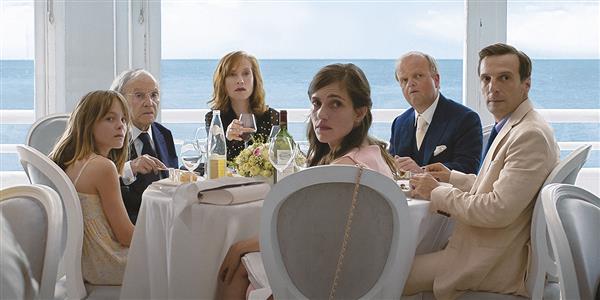
If Loveless digs its nails into Russia’s morass of blind self-centeredness, Michael Haneke’s Happy End wants us to scoff at a similar kind of vapidity within the ranks of old-stock French bourgeois sensibilities. The problem, however, is that Haneke’s critical dagger is almost completely dull-edged, offering no substantial opportunities for inventive digs at his subjects. At most, he manages a nick or two, and that’s being generous.
The plot is relatively scattershot, dividing our attention between various members of the industrious Laurent clan, including businesswoman Anne (Isabelle Huppert), her brother Thomas (Mathieu Kassovitz), his young daughter Eve (Fantine Harduin) and family patriarch Georges (Jean-Louis Trintignant). Anne is getting married to an English developer (Toby Jones), but an industrial accident at her family’s company puts her on continual edge as she must sort out the mess. Thomas’ ex-wife has mysteriously overdosed on her prescription medications, and after she dies, he conducts a kinky online affair with a cellist… while still married to his current wife, Anaïs (Laura Verlinden). Eve is constantly depressed after her mother’s death and is relatively detached from family affairs, while Georges is depressed for entirely different reasons—namely, his own declining health.
Haneke does thrive in finding wry laughs in some unexpected scenarios; for instance, there’s a karaoke version of Sia’s “Chandelier” that is so off-the-wall that you can’t help but giggle at the absurdity. And I must say, the film’s ending has that Haneke brand of wicked impishness that I couldn’t resist, try as I might. Unfortunately, almost everything that comes before it feels like Haneke on autopilot—or, even worse, a pale imitation of what this immensely talented man has delivered during the course of his illustrious career. For much of this, I was really missing the derring-do of the man who has brought us such intellectually stimulating works as Funny Games, Caché and The Piano Teacher.
Perhaps on another day, I might have been taken by Haneke’s off-kilter look at a decaying breed of people; when seen immediately after the searing and incisive Loveless, however, there is absolutely no comparison. I walked away from the latter with my bone marrow encased in ice. When I walked away from Happy End, my numbness came from the shocking reality that Haneke has managed to make something so minor, uninteresting, and very much beneath his true abilities as an artist.
The Killing of a Sacred Deer (Yorgos Lanthimos)
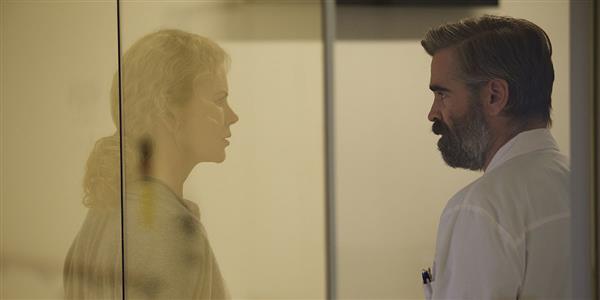
Leave it to Yorgos Lanthimos to lay on the weirdness quotient as thickly as possible. I can’t help but admire his style, for it’s like none other. Deliberately wonky and clinical, with a distinct abrasiveness due to his distaste for excessive affect, his films are true microcosms of the most unsettling aspects of our fundamental natures. The Killing of a Sacred Deer falls in the same vein as his other works, blending the hyperreal violence of Dogtooth with the sci-fi existentialism of The Lobster in order to create yet another madcap example of his own unique vision as an artist.
Story-wise, this is perhaps his most straightforward feature yet: a cardiovascular surgeon named Steven Murphy (Colin Farrell) begins bonding with his daughter’s classmate, a strange and unconventional kid named Martin (Barry Keoghan). At first, their relationship seems paternal and innocent, but soon Martin begins cropping up everywhere the Murphys go, giving the family no peace. When, one day, Steven’s son Bob (Sunny Suljic) finds that he is unable to walk or eat, Martin’s true intentions become clearer as a dark chapter in Steven’s career comes to the fore.
One thing that fans of Lanthimos will notice is that this story feels pared down compared to The Lobster. There are fewer characters, the stakes are made clear much earlier, and the bizarreness factor does not run rampant, apart from, perhaps, the deliciously bonkers lines that some of the cast members have to recite in that typical Lanthimos deadpan. This is tighter, crisper, and overall much more focused than his English-language debut, and it fares better as a result.
The major problem, however, is that once Lanthimos finishes his scene-setting and begins unleashing his thrills and chills after Martin’s secret is revealed, he quickly has nowhere left to go. Much of the last half becomes locked in an unsatisfying stasis that is only allayed intermittently by the sheer strength of the performances—particularly Nicole Kidman’s. As Steven’s loyal wife, she embraces the tonal peculiarities with a breezy ease and zest, hitting each and every mark given to her. Raffey Cassidy is also very good as her daughter, whose role expands in the film’s latter sections, and Keoghan never falters in creating a truly menacing presence. But none of them can save a script that is forced to sputter to a stop when the tonal exercises reach their peak potential.
If Lanthimos has trouble locating the landing strip, I will say this: he still knows how to spin one heck of a finale. Creating a parodic take on the iconic climaxes of Sophie’s Choice and Funny Games, which showcase the emotional purgatory of parenting in extremis (and a theme which this film most certainly invests itself in), we are left to witness a brutal resolution that is fantastically orchestrated and edited, full of uncertainty and malaise that never wavers until the credits begin rolling. It’s hard not to look away from what transpires, which is why I think The Killing of a Sacred Deer is ultimately a success, warts and all. I’m not going to kvetch unduly when the pervading experience left me pinned to my seat and almost begging for more.
And if you do see this, you must do so in a theater with good acoustics. The accordion-based score must slice into your eardrums if you want to get the full, otherworldly impact of this bizarre and precise work.
Call Me by Your Name (Luca Guadagnino)
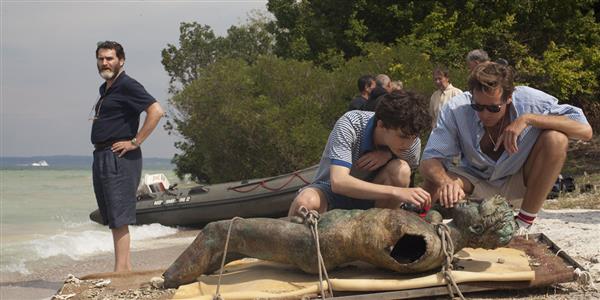
I ended my first day of Toronto International Film Festival at the Ryerson Theatre, surrounded by public festivalgoers, with my most anticipated film of the festival: Luca Guadagnino’s Call Me by Your Name, a romantic coming-of-age story set in sultry Italy during the early 1980s. Dealing with a teen boy’s growing desire for his father’s handsome research assistant, the film documents their delicate, at times frustrating pas-de-deux. It warmly embraces the fickleness of first love, the confusing elements of queer desire, the raptures of bodily contact, the hormonal fervour of meeting a soulmate, and—above all—the tranquility of total togetherness.
The grace notes here are ravishing in their simplicity. Guadagnino allows the story to build organically, replicating the awkward pacing of Elio (Timothée Chalamet) and Oliver’s (Armie Hammer) own courtship so that, when the two finally reveal their true feelings to each other, there is a sense of completion and catharsis. The slow buildup to their inevitable coupling is what drives our own emotional investment: every time Elio balks, or Oliver plays it too cool, we carve out a sense of their core identities, inlay them with our own experiences of failed first encounters, and become more and more drawn towards the ebbing tide that slowly pulls them together. When the climactic contact hits, there is not only relief, but also a satisfying unity in seeing the culmination of factors that have driven these events towards their zero hour.
I admit, after I watched this, I thought Guadagnino was too liberal with the story’s languid torpors. Now I see it as a fundamental strength, for how can Michael Stuhlbarg’s emotionally-potent monologue at the end of the film make one sob into one’s hands if Elio and Oliver’s entire saga were abbreviated and prettified? Stuhlbarg’s Mr. Perlman tells his son that what he had with Oliver was special. We have seen this play out in the strange timing of protracted courtship, and because of this, the results are both true to heart and voluminous in payoff. The film’s song is heard, and we the hearers are moved beyond measure.
I will have much more to say about this film when I review it properly in a few months. Take my word for it, though: it’s a pure example of filmmaking through the contours of intense, uninhibited tenderness. When the credits rolled and the lights went up, the audience gave a rousing applause; when the cast came out for the Q&A, the applause turned into an ovation. Completely deserving, of course.
The Q&A was attended by Guadagnino, Chalamet and Hammer, all looking as dapper as expected. The questions were not overly complicated, but they yielded the desired fruit. Guadagnino revealed that the film had a quick post-production turnover; it was shot in two months and done in one, edited simply and cleanly. He also told us that one 35mm lens was used for the entire shoot—surely an impressive feat, as many filmmakers can attest to. Hammer explained that his intimacy with Chalamet was culled from several weeks of being the lone Americans in Crema (the city in Italy where the film was shot), and by bonding in their spare time, they fashioned a friendship that was still going strong.
Guadagnino also talked about the adaptation process, as this story was first a novel by André Aciman. One fan wondered why a certain toilet scene from the book never made it into the film; Guadagnino was adamant we understand that books and films are separate mediums, and that he was more interested in capturing the essence of Aciman rather than every detail of his plot. The novel was also very useful to Chalamet, who consulted it often when required to convey the internal structures of Elio’s personality. James Ivory, the great director of the Merchant-Ivory team, wrote the screenplay, and I’d say did a fantastic job of letting Elio’s character unspool without the need for too much speech and exposition. As his good friend, Guadagnino was quite happy to confirm that Ivory was very easy to collaborate with.
That ended my first day of Toronto International Film Festival, which was, all in all, a good day of screenings. With the exception of Happy End, I was sufficiently challenged by the stories and artistic merits of these films, and I was looking forward to what Day Two would bring me.
I Am Not a Witch (Rungano Nyoni)
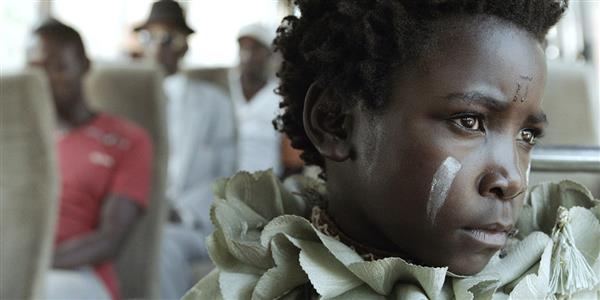
September 8th was intended to begin with a screening of Sean Baker’s The Florida Project. Alas, being new to the press game, I arrived in line too late; with maybe only six or seven people ahead of me, the theatre reached full capacity and everyone left outside was shut out. I pulled out my schedule in a fluster, wondering what I could fill up the now-vacant timeslot. I heard some people talking about seeing Rungano Nyoni’s I Am Not a Witch, which also played at Cannes earlier this year, so I made the snap judgment and headed over Cinema 4 (which was fortunately only steps away from where The Florida Project was playing).
Turns out, I had made a good call, because I Am Not a Witch is an example of a truly fantastic debut. Set in Zambia, the film opens with English tourists gawking at a group of so-called “witches” who are separated from them by a barrier and tethered to spools of rippling white ribbons. When asked why this is so, the tour guide tells them that, if they are not tied down, they would fly away and be free to commit their acts of wickedness. At this stage, I was fearing the film would somehow fetishize these women—make them objects of inscrutability, or show them to be silent talismans of a larger power. Luckily, that fear was unwarranted. These women are neither enigmatic nor supernatural; rather, they are ordinary people forced to live a lifestyle foisted upon them by rampant superstition and cruel opportunism.
Our guide to this new world is a reticent nine-year-old (Margaret Mulubwa), who is promptly accused of witchcraft in her little village after a woman trips and loses her water. The testimonies are relayed to a visibly skeptical policewoman, and one story in particular is stupid enough to be funny. In fact, this film is very funny at times, satirizing to the point of near-caricature the patriarchal power structures in Zambia that segregate these women, represented best by the gregarious, grovelling government official Mr. Banda (Henry B.J. Phiri). Nyoni allows us to laugh at the stupidity so that we recognize it for what it is, and I appreciated this approach—especially since she could have easily turned this into a sombre docudrama.
The real beauty of this film, however, is definitely found in the nine-year-old’s vantage. Christened by her new clan as Shula (a name which she ends up adopting herself), the girl’s experiences as Zambia’s youngest witch end up highlighting the grim stakes that such a title entails. Exploitation, being socially ostracized, and having to “select” the culprit in criminal cases based on perceived mystic intuition are only some of the burdens that these “witches” are forced to put up with, and the millstones are magnified in impact when applied to a small girl who has little to no control of the forces operating around and against her.
Mulubwa’s central performance, redolent with unease and growing mistrust, is perfectly pitched. So, too, are the numerous interactions she has with the clan of “witches” who toil the fields and quarries, doing the hard labor that nobody else wants. The scenes with these women are small little treats that we’re privileged to consume, and the natural way in which Nyoni documents their feminine solidarity and friendship provides the film with an air of triumph. Though society has cast them out, they are neither alone nor unwanted. In a sense, they may be freer than the people who descried their existence in the first place.
Nyoni sets up her characters and their personalities in such a way that, when the finale hits, she is able to pull off something devastating without it feeling unexpected or tonally inconsistent. Coupled with David Gallego’s artistically virtuosic cinematography, the final images groan with the full weight of mourning and loss, while signalling changes that, while not necessarily hopeful, still manage to leave us with more peace than pain. Her success was noted: when the screening ended, there was some applause—an uncommon occurrence in rooms full of objectively critical people. It won me over, and I was glad others were won over, too.
A Fantastic Woman (Sebastián Lelio)
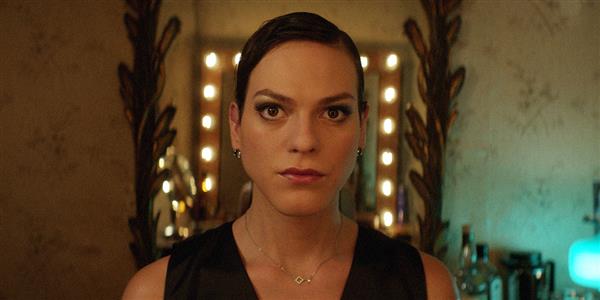
The Chilean entry for Foreign Language Film at next year’s Oscars, A Fantastic Woman could very well be nominated, and the reason for it would not be elaborate: it’s a great film with a great lead performance, possessing a timeliness that other films may not share. It follows the personal odyssey of Marina Vidal (Daniela Vega), a waitress and nightclub singer who also happens to be a trans woman, and the difficulties she faces living in a part of the world that is still not as accepting of her as others.
One night, after dinner and a bout of lovemaking, her older boyfriend Orlando (Francisco Reyes) suffers an aneurism, accidentally falls down a flight of stairs, and later dies in hospital. His bruised body attracts the suspicion of the doctor, as does Marina’s flight from the hospital after hearing the tragic news. The doctor’s decision to involve the police initiates a volley of misogyny, homophobia and transphobia that Marina must weather—and she does. Almost impervious to the BS that is constantly lobbed at her, she walks away from every hateful encounter with dignity and our compassion. Her emotions may crumble after some particularly ugly abuse, and her walk may, at times, lose its snappy confidence, but nothing anyone says or does diminishes her human worth.
This film is 100% about Vega, and she unquestionably delivers the goods. Brimming with attitude and a clear love for her selfhood, she gives Marina every quality one would want and expect in a trans role model. Furthermore, there is no doubt that director Sebastián Lelio respects her immensely. Always filming her in a flattering light, giving her an almost-exclusive monopoly on the film’s running time, and providing key moments of beauty and empowerment, Lelio works in Vega’s favor time and again, and the result is a film that would be proudly held as an example of sterling LGBTQ art.
What I find most fascinating about this particular film is the way it seems to draw on the influence of Dante’s Inferno, queering it and giving it a new lease in our modern world. The Hell that Marina visits is self-explanatory; Virgil and Beatrice are both found in Orlando (a name already associated with the queer canon by virtue of Virginia Woolf’s novel), and her quest becomes a search for her own sacred Paradise—one that, unfortunately, cannot include her dead lover, but one where she can still remain true to herself and guarded from hatred and bigotry. As she traverses various underworlds and forbidden places, trying to solve Orlando’s last remaining mysteries and finding ways to mourn his passing, this deliberate queering of cis mythology ends up being a subtly distinct feature of this film, and one that I’ve come to respect immensely.
Indeed, it is a testament to the film that, underneath the sparse plotting, there is so much playfulness and subversion going on that new strands could ostensibly reveal themselves upon each new viewing. I wish I could watch it again right now and see if I can uncover more. For now, one TIFF screening is all I have to go on, but I was more than convinced that this is a film rich in potential, and a testament to the heroism of our trans and queer communities.
Lady Bird (Greta Gerwig)
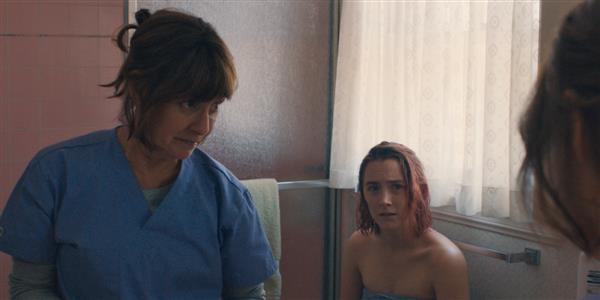
My last film of Day Two was yet another anticipated title, and just like with Call Me by Your Name, I viewed it at the Ryerson alongside the public. After a rapturous reception at Telluride, Greta Gerwig and most of the cast of her debut feature Lady Bird (minus its star, Saoirse Ronan, who was busy overseas filming Mary, Queen of Scots) made their way to Toronto to promote the work. The thing is, though, the film promotes itself. I’ve never been to a public screening that was so automatically receptive to a film, with everyone laughing in unison at the same points, at the same jokes, and at the same line deliveries. The programmer teased us that we would recognize how special the film was from the first thirty seconds, and I have to say, these programmers are never wrong. This one certainly wasn’t.
In a nutshell, Lady Bird revolves around a Sacramento teen named Christine McPherson (Ronan), who uses the moniker “Lady Bird” because, well, her parents didn’t choose it. Red-haired and rebellious, Lady Bird and her best friend Julie (Beanie Feldstein) try to find new ways to while away their final year at their Catholic high school, getting into hijinks whenever the opportunity arises.
Cute boys, popular girls, handsome teachers, stern nuns, emotional priests—basically what you’d expect in such a setting—all make outrageously entertaining entrances and exits, while in the meantime, Lady Bird begins applying to out-of-state colleges. Her worst fear is being perpetually stuck in her house, a shambling old thing with dated furniture and cramped rooms. She also doesn’t want to be under the domain of her parsimonious and nagging mother, Marion (Laurie Metcalf), who Lady Bird thinks doesn’t like her.
The magic of Lady Bird lies in the ways it operates at multiple levels, all of them completely synchronized and balanced. In one sense, it acts as a cozy paean to Gerwig’s Californian roots, paying tribute to the majesty of home and belonging even when it’s easily taken for granted. In another, it is a compassionate love letter to mothers from their daughters, implicitly giving thanks for their sacrifices and selfless protection. Finally, it is a buoyant celebration of adolescence in a way that is uncompromising about its potential for craziness and destruction. It’s a time of blind stupidity, ungraceful pratfalls and self-conscious image management, and Gerwig documents it all with her unbridled wit and sharply-honed observations to impeccable effect.
The giddy aura of Lady Bird is infectious. Gerwig edits her scenes with the tight elasticity of a whip, so that the joie de vivre never stops flowing. And yet, she is careful that the pacing does not become too breathless, inserting small, poetic musical interludes to emphasize that her work has major clout as a form of audiovisual poetry. The actors are unquestionably incredible, from Ronan’s fierce energy and radiant youth to Metcalf’s quiet dignity and withering sarcasm. In between we have the likes of Lucas Hedges, Feldstein, Timothée Chalamet (in a much different role than the one he has in Call Me by Your Name), Tracy Letts, Stephen McKinley Henderson and Lois Smith giving the ensemble a true stamp of quality that I’ve only seen in a few other films this year.
It’s possible that I am overselling this. However, based on how uniformly positive the reaction to this film has been thus far, I don’t think so. I believe this is one of the greatest debuts in recent years, and it marks an incredibly auspicious start to Gerwig’s potential career behind the camera. Her success has certainly been overwhelming; during the Q&A, with a tearstained face, she admitted that she had been crying throughout the entire press tour. She certainly did not expect this much love, and I have no doubt she’ll keep getting it for months—and years—to come.
The Q&A was largely a collective lovefest in Gerwig’s honor, with the attending cast all taking turns to either praise or thank her efforts. Perhaps the most surprising tidbit came about when an audience member asked about Ronan’s casting. Greta revealed that she had first met Ronan at TIFF in 2015, and that she ended up casting her after the two read through the entire script one night in Greta’s Toronto hotel room. Greta ended the anecdote by admitting that, if it wasn’t for Toronto International Film Festival, the film probably wouldn’t exist, which garnered a strong applause from the audience.
Toronto International Film Festival
Next time, I will be reviewing the latest efforts from filmmakers such as Joachim Trier, Sean Baker, Martin McDonagh and Andrew Haigh. Look for that in the coming days. Now if you’ll excuse me, I have to go to sleep so that I’m ready and alert for my next screening!
What is your favorite directorial debut in recent memory?
The Toronto International Film Festival runs from September 7th to the 17th.
Does content like this matter to you?
Become a Member and support film journalism. Unlock access to all of Film Inquiry`s great articles. Join a community of like-minded readers who are passionate about cinema - get access to our private members Network, give back to independent filmmakers, and more.
Tomas is a chronic cineaste who studied English literature in university (in both the undergraduate and graduate levels), and hopes to pursue a career in writing. His passion for film began in earnest at the beginning of the 2010s, and since then he's been reveling at the vast horizons of the cinematic landscape like a kid at the proverbial candy store.













